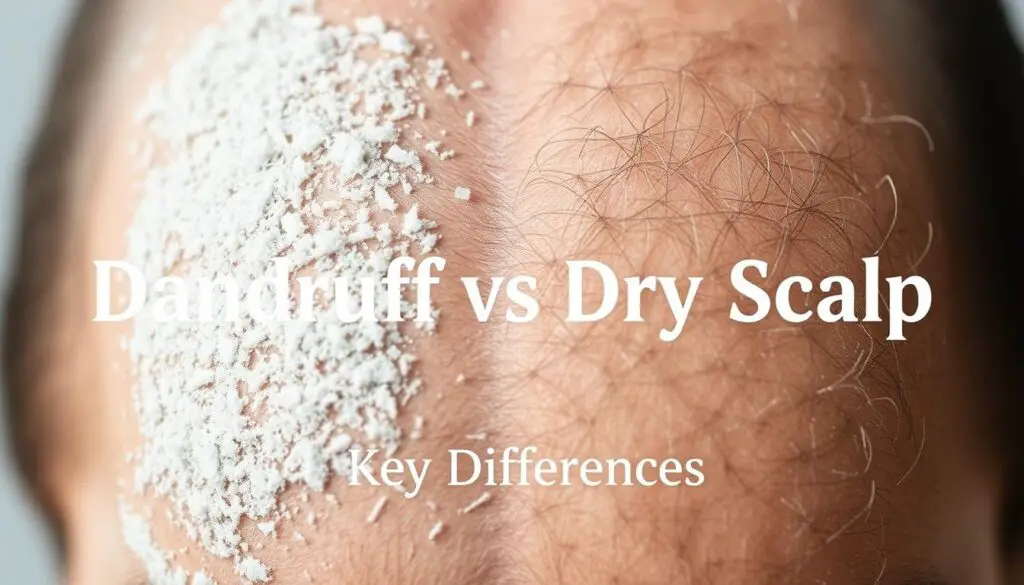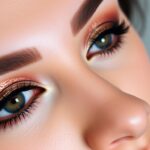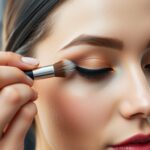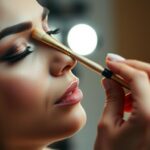Ever brushed off white flakes from your shoulders, wondering about your scalp? The fight between dandruff and dry scalp is more complex than you might think. Many people mix up these two scalp issues, using their terms the same way.
Knowing the difference between dandruff and dry scalp can change your hair health game. Both cause flaky scalp symptoms, but they come from different causes. Dandruff has oily, big white or yellow flakes. Dry scalp, on the other hand, has small, dry white flakes that show a lack of moisture.
Your scalp is a complex world with nearly 100,000 hair follicles. When this balance is upset, you might feel itchy and self-conscious. Knowing if you have dandruff or a dry-scalp is key to treating and healing your scalp.
In this detailed guide, we’ll explore scalp health deeply. We’ll look at the differences between dandruff and dry scalp. You’ll learn about their unique traits, causes, and how to manage and prevent them.
Table of Contents
Understanding Dandruff: What It Is and Its Causes
Dandruff is a common scalp condition that affects millions of people worldwide. It’s characterized by flaking skin on the scalp, often accompanied by itching and irritation. Knowing what causes dandruff can help you manage it better.
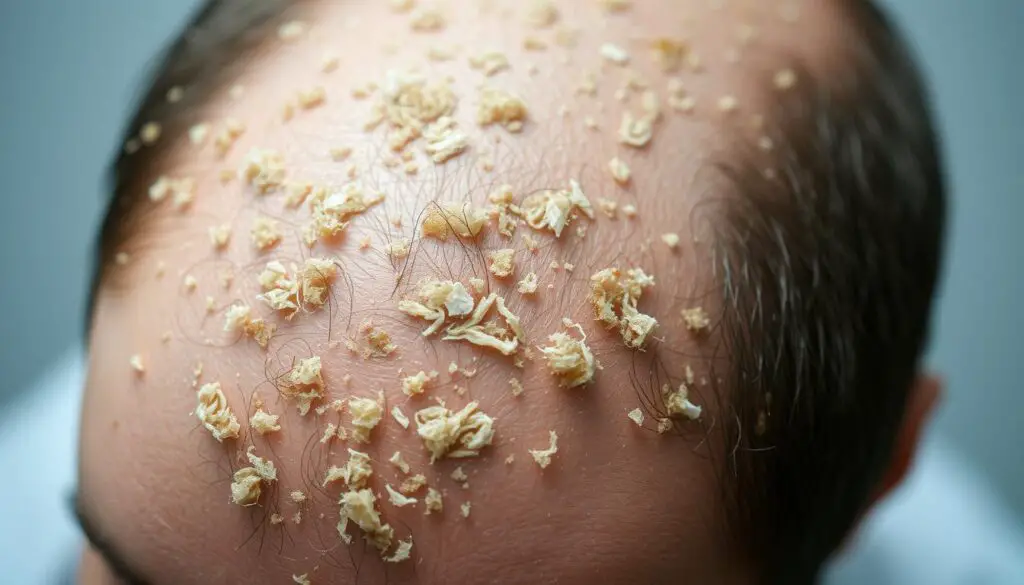
The Role of Malassezia
A tiny fungus called Malassezia is at the heart of dandruff. This yeast is found on most adult scalps. But for some, it can cause seborrheic dermatitis and make skin cells grow too fast. About 50% of people get dandruff at least once, mainly because of this fungus.
- Malassezia thrives in oily environments
- Overgrowth triggers increased skin cell production
- Can cause inflammation and irritation
Skin Cell Turnover
Your scalp sheds dead skin cells all the time. But with dandruff, it sheds them much faster. This makes your scalp look flaky and oily. The flakes are usually off-white or yellow and can be quite noticeable.
Potential Triggers
Many things can make dandruff worse. Stress is a big one, affecting about 25% of people. When they’re stressed, their dandruff symptoms get worse.
| Trigger | Impact on Dandruff |
|---|---|
| Stress | Increases scalp oil production |
| Hormonal Changes | Stimulates sebum production |
| Weather Conditions | Can intensify scalp sensitivity |
Medicated shampoos with antifungal ingredients can treat dandruff well, with success rates of 70-80%. If dandruff doesn’t go away, seeing a dermatologist can help a lot.
Exploring Dry Scalp: Characteristics and Causes
A dry scalp can be frustrating and uncomfortable. It’s common among many people. Knowing what causes it and its signs is key to managing it.
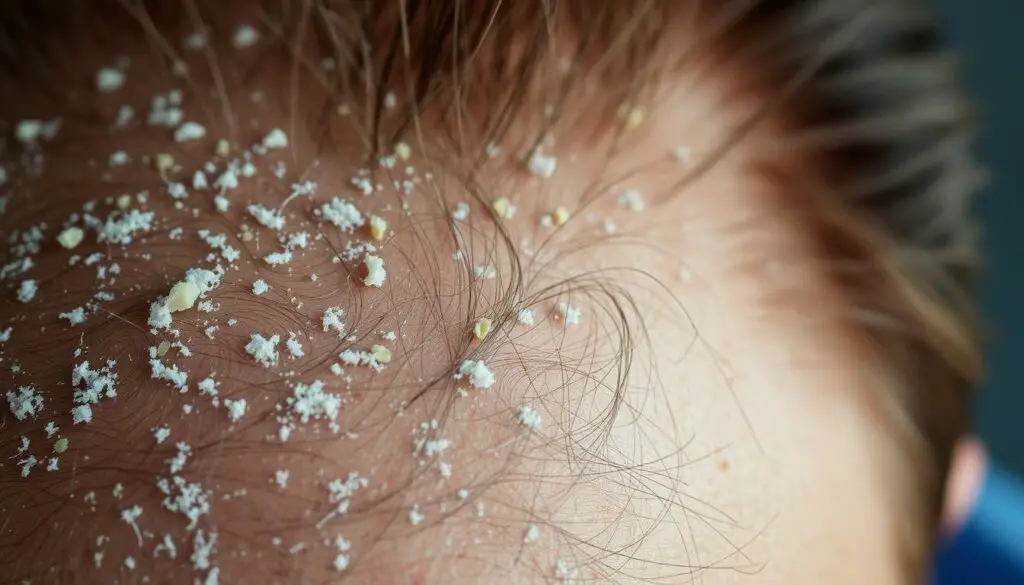
Lack of Moisture: The Primary Culprit
Your scalp’s health depends on its moisture. Without enough hydration, you might feel itchy and dry. Several things can lead to moisture loss:
- Frequent use of harsh hair products
- Extreme weather conditions
- Dehydration
- Aging
Weather Factors and Environmental Impact
Cold, dry air can dry out your scalp. Winter months often make it worse, causing tightness and flaking. Using a humidifier can help fight these environmental challenges.
“Maintaining scalp hydration is key to preventing dryness and discomfort.”
Underlying Skin Conditions
Sometimes, a dry scalp hints at deeper skin problems. Issues like eczema, psoriasis, or seborrheic dermatitis can cause long-lasting dryness. If symptoms last, see a dermatologist.
Drinking lots of water and using gentle, sulfate-free hair products can help. Remember, everyone’s scalp is different. Finding the right solution might take some trial and error.
Key Symptoms of Dandruff
Dealing with a flaky scalp can be frustrating and uncomfortable. Understanding the specific symptoms of dandruff helps you identify and address this common scalp condition effectively.
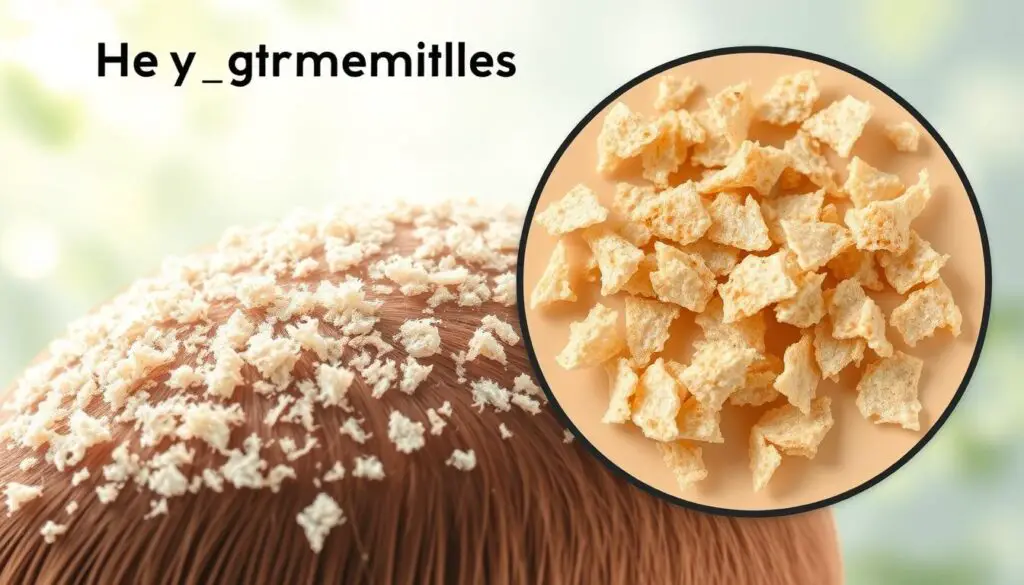
Recognizing Flaking and Scaling
Dandruff presents distinctive flaking characteristics that set it apart from a typical dry scalp. The flakes are typically:
- Larger in size
- Yellow-tinged or oily in appearance
- More noticeable on dark clothing
Itching and Irritation Patterns
An itchy scalp is a hallmark sign of dandruff. The irritation can range from mild to intense, often accompanied by:
- Persistent scalp discomfort
- Increased urge to scratch
- Potential redness or inflammation
Flake Color and Texture Analysis
Unlike dry scalp flakes, dandruff flakes have unique visual characteristics. They are often:
- Larger and more prominent
- Slightly yellow or greasy
- More likely to cluster together
“Most cases of dandruff are treatable with consistent care and the right approach.” – Dermatology Experts
If you’re experiencing persistent symptoms of an itchy scalp or significant flaking, consider consulting a healthcare professional for personalized guidance.
Key Symptoms of Dry Scalp
Knowing the signs of a dry scalp helps you tackle this common issue. Dry scalp symptoms are different from other scalp problems.
Dryness and Tightness Sensations
A dry scalp feels tight and uncomfortable. You might feel your skin pulling after washing your hair. This is because your scalp lacks natural moisture.
Flake Characteristics
Dry scalp flakes are not like dandruff. They are:
- Smaller in size
- Whiter in color
- Drier and less oily
- Less dense compared to dandruff flakes
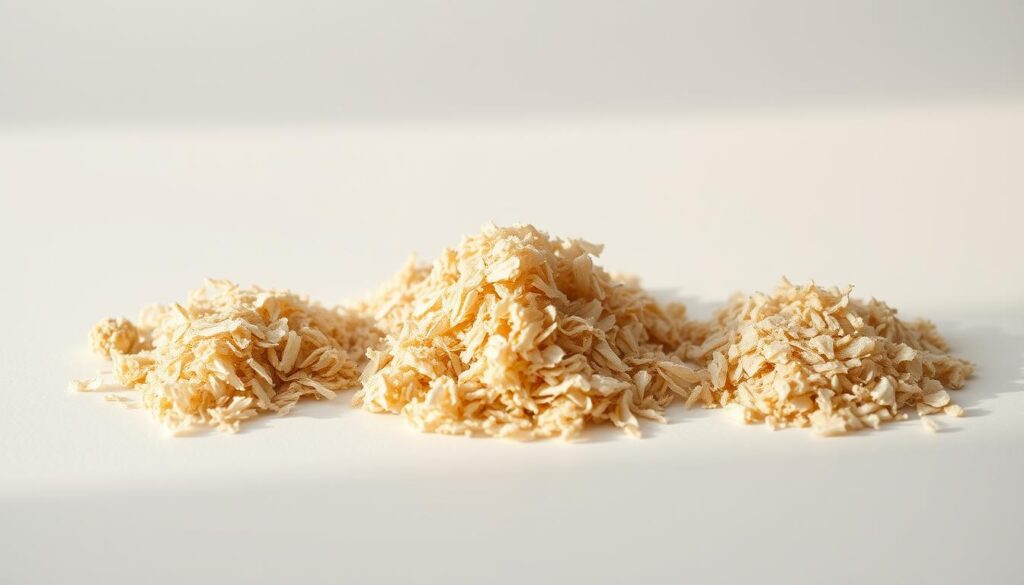
Itchiness and Irritation
The itchiness from a dry scalp can range from mild to moderate. It’s caused by dry skin, not fungus. Scratching can make it worse.
“A dry scalp is your skin’s way of signaling it needs more moisture and attention.”
| Symptom | Dry Scalp Characteristics |
|---|---|
| Skin Sensation | Tight, stretched, uncomfortable |
| Flake Appearance | Small, white, dry flakes |
| Itching Intensity | Mild to moderate |
By recognizing these symptoms, you can start to heal your scalp. This helps prevent more irritation.
Dandruff: Common Misconceptions
Dandruff is often misunderstood, leading to unnecessary confusion and ineffective treatment approaches. Many people hold incorrect beliefs about this common scalp condition. These beliefs can impact your overall scalp care strategy.
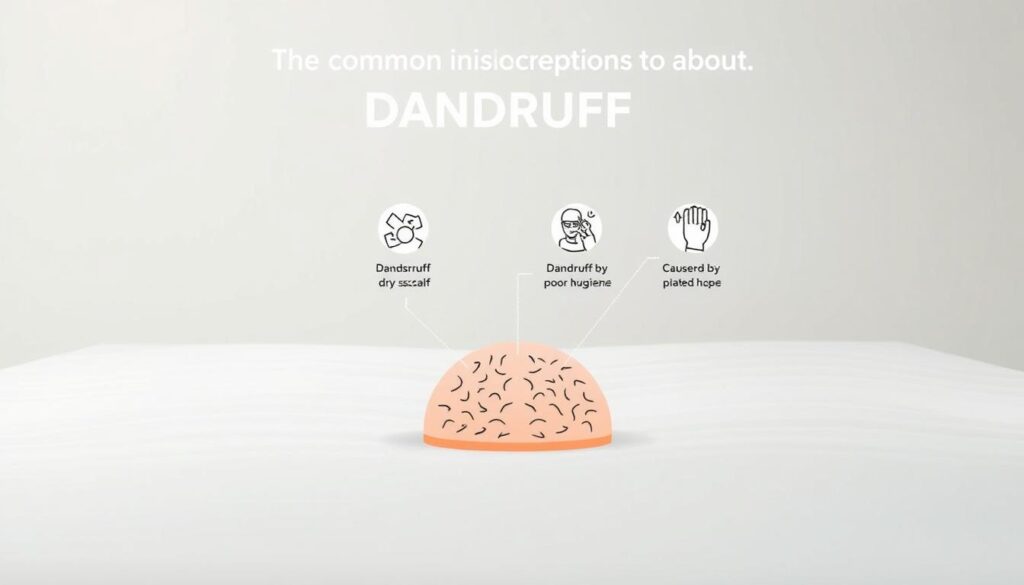
Debunking the Hygiene Myth
One of the most persistent myths about dandruff is that it results from poor personal hygiene. Research shows this is completely false. Dandruff is actually caused by multiple factors, including:
- Overproduction of scalp oils
- Presence of Malassezia fungus
- Individual skin cell turnover rates
- Genetic predisposition
Contagion Misconception
Another common misunderstanding is that dandruff is contagious. This is categorically untrue. Dandruff treatment requires understanding its root causes, which are typically related to individual scalp conditions.
“Dandruff is a personal scalp condition, not a communicable disease.”
Treatment Possibilities
Contrary to belief, dandruff can absolutely be treated. Effective dandruff treatment options include specialized shampoos containing ingredients like:
- Ketoconazole
- Selenium sulfide
- Pyrithione zinc
With proper scalp care and targeted treatments, most individuals can successfully manage and reduce dandruff symptoms. Consulting a dermatologist can provide personalized strategies for your specific scalp condition.
Dry Scalp: Common Misconceptions
Understanding dry scalp is more than just knowing it exists. Many people get it wrong, leading to poor treatment and discomfort. Let’s clear up some common myths about dry scalp and what it really is.

Myth: Dry Scalp Only Happens in Winter
Many think dry scalp is just a winter problem. But, dry scalp can happen any time of the year. It’s caused by things like:
- Indoor heating
- Air conditioning
- Humidity levels
- Personal skin chemistry
Myth: Dry Scalp is Not a Serious Condition
While it might seem minor, dry scalp can really bother you and harm your hair. About 60% of adults deal with it, showing it’s a big deal. Dry scalp can cause:
- Persistent itching
- Scalp irritation
- Potential hair damage
Myth: Dry Scalp is the Same as Dandruff
Many confuse dry scalp with dandruff. But, dandruff vs dry scalp are not the same. They have different causes:
“Understanding the difference is key to effective treatment.” – Dermatology Experts
Dry scalp is from not enough moisture. Dandruff is from too much oil and fungus. Only 30% of those with dry scalp get medical help, showing we need to know more.
Knowing these myths can help you take better care of your scalp. It also helps you pick the right treatment for your problem.
Diagnosing Dandruff vs. Dry Scalp
It can be hard to tell the difference between dandruff and dry scalp. They both have similar signs, making it important to check yourself. Knowing the small differences can help you choose the best treatment.
Self-Assessment Techniques
To figure out if you have dandruff or a dry scalp, look closely at your scalp:
- Examine the flake appearance
- Dandruff: Large, oily, yellow or white flakes
- Dry scalp: Small, dry, white flakes
- Check scalp texture
- Dandruff: Oily, greasy feeling
- Dry scalp: Tight, rough sensation
- Observe itching intensity
- Dandruff: Persistent, intense itching
- Dry scalp: Mild, intermittent itching
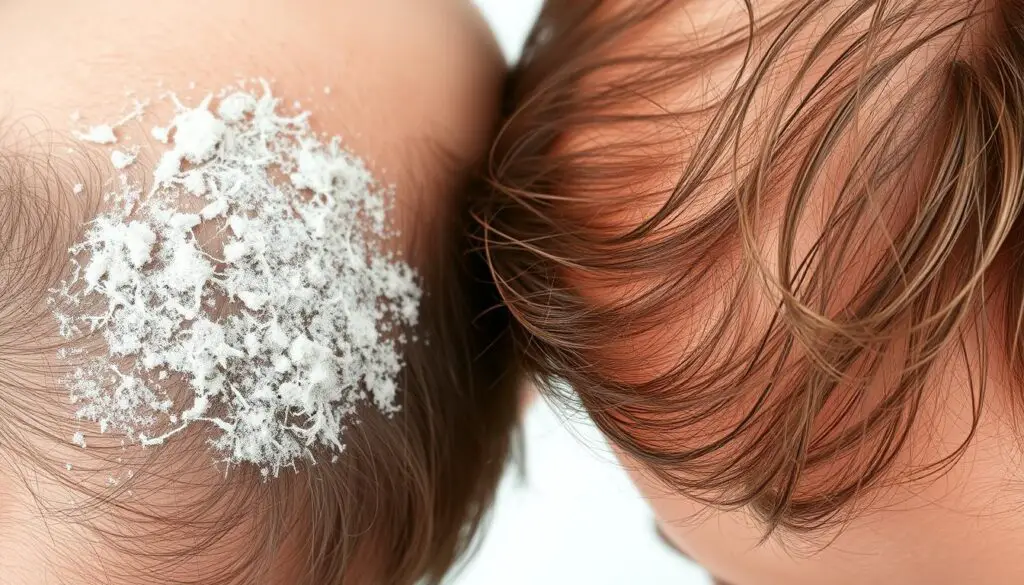
When to Seek Professional Help
Even with self-checks, some signs mean you should see a dermatologist:
- Severe scalp redness
- Persistent itching that doesn’t improve
- Development of small sores
- Flakes that don’t respond to over-the-counter treatments
| Condition | Key Indicators | Recommended Action |
|---|---|---|
| Dandruff | Oily, yellow flakes | Medicated anti-dandruff shampoo |
| Dry Scalp | Small, white, dry flakes | Moisturizing scalp treatments |
“Early detection and proper treatment can significantly improve scalp health and comfort.”
If your scalp problems keep coming back or get worse, it might be a sign of something bigger. Always get help from a professional if your symptoms don’t go away or get worse.
Effective Treatments for Dandruff
Dealing with dandruff can be frustrating. But, many effective treatments are available to help manage this common scalp condition. Knowing the right approach can greatly help in controlling those pesky white flakes.
Choosing the Best Anti-Dandruff Shampoo
Choosing the right anti-dandruff shampoo is key for effective treatment. Look for these important ingredients:
- Zinc Pyrithione: Kills bacteria and fungus
- Ketoconazole: Powerful antifungal agent
- Selenium Sulfide: Reduces fungal growth
- Salicylic Acid: Helps remove scalp scales
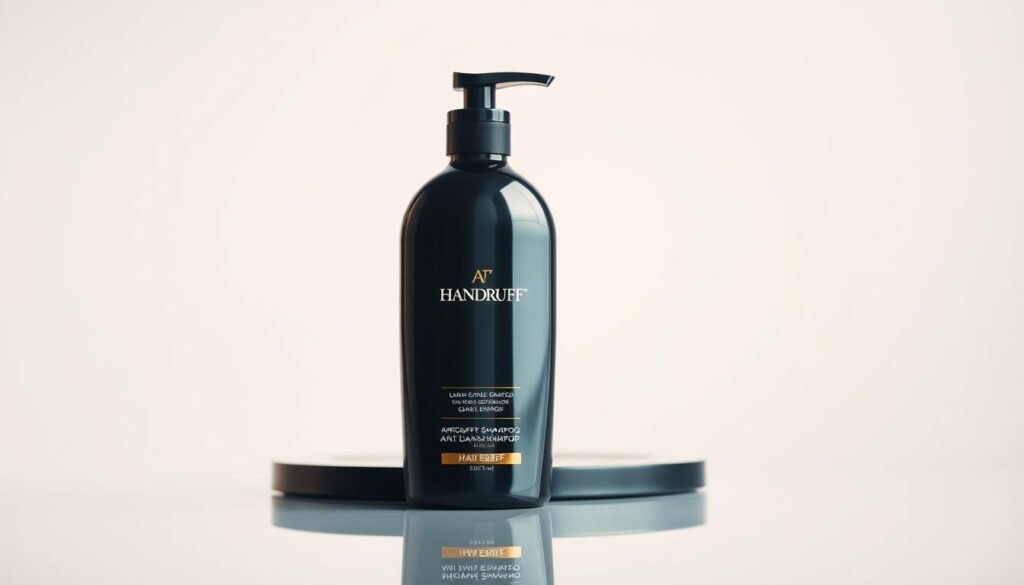
Lifestyle Changes for Dandruff Treatment
Your daily habits can greatly impact dandruff control. Stress management and diet modifications are crucial for a healthy scalp.
- Reduce stress through meditation or exercise
- Eat foods rich in zinc and B vitamins
- Avoid too much sugar and processed foods
- Stay hydrated
Home Remedies for Dandruff
Natural solutions can complement your dandruff treatment strategy.
Try these home remedies to support your dandruff treatment:
- Coconut oil: Natural antifungal properties
- Tea tree oil: Potential antimicrobial benefits
- Apple cider vinegar: May help balance scalp pH
- Aloe vera: Soothing scalp treatment
Remember, consistency is key when treating dandruff. If over-the-counter anti-dandruff shampoos don’t work after several weeks, see a dermatologist for professional advice.
Effective Treatments for Dry Scalp
Dry scalp can be uncomfortable and frustrating. But, with the right approach, you can restore your scalp’s health and comfort. Knowing the best treatments and care strategies is key for managing this common condition.
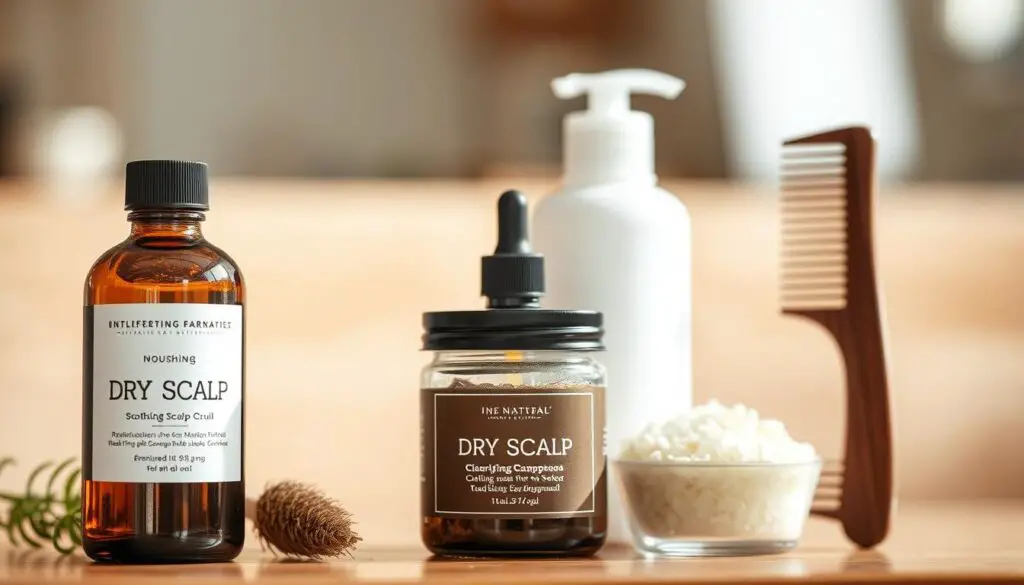
Moisturizing Products for Scalp Care
Choosing the right moisturizing products is crucial for dry scalp management. Look for hair care solutions that offer deep hydration without weighing down your hair. Key ingredients to seek include:
- Hyaluronic acid
- Niacinamide
- Natural oils like argan and jojoba
- Panthenol (vitamin B5)
Hydration Tips for Scalp Health
Your scalp needs both internal and external hydration. Drink plenty of water and consider these hydration strategies:
- Consume water-rich foods
- Limit hot shower duration
- Use lukewarm water when washing hair
- Apply leave-in conditioners
Creating a Comprehensive Scalp Care Routine
A consistent scalp care routine can significantly improve dry scalp conditions. Here’s a recommended approach:
| Step | Action | Frequency |
|---|---|---|
| Cleansing | Gentle, sulfate-free shampoo | 2-3 times per week |
| Moisturizing | Hydrating scalp serum | Daily |
| Protection | Scalp sunscreen | As needed |
“Consistent care is key to managing dry scalp and maintaining healthy hair.” – Dermatology Experts
By implementing these targeted treatments and understanding your scalp’s unique needs, you can effectively manage dry scalp and achieve optimal scalp health.
Preventing Dandruff: Tips and Tricks
Dandruff is a common scalp issue that bothers many people. It affects about 50% of adults at some time. Knowing how to prevent it is key for good scalp care.
To fight dandruff, you need a plan that covers all bases of scalp health.
Regular Shampooing Techniques
Cleaning your scalp well is the first step against dandruff. Here’s how to do it right:
- Use medicated anti-dandruff shampoos
- Wash your hair 2-3 times a week
- Massage your scalp gently while washing
Avoiding Harsh Products
Keep your scalp safe from harsh hair products. Here’s what to do:
- Choose sulfate-free shampoos
- Use fewer styling products
- Go for gentle, scalp-friendly products
Healthy Diet Considerations
What you eat affects your scalp health. Eat foods that help fight dandruff:
| Nutrient | Beneficial Foods | Impact on Scalp |
|---|---|---|
| Zinc | Pumpkin seeds, lean meats | Reduces inflammation |
| Omega-3 | Fatty fish, walnuts | Promotes scalp moisture |
| Vitamin B | Eggs, whole grains | Supports skin cell health |
“Preventing dandruff is about creating a balanced approach to scalp care that combines proper hygiene, nutrition, and gentle treatment.” – Dermatology Experts
By using these tips, you can lower your risk of dandruff. This helps keep your scalp healthy and comfortable.
Preventing Dry Scalp: Moisture Retention Strategies
Keeping your scalp healthy is key. Dry scalp can be a real pain. But, with the right steps, you can stop it before it starts.
Knowing how to care for your scalp is important. About 30% of people worldwide deal with dry scalp. It’s a big issue for many.
Choosing the Right Hair Products
Choosing the right hair products is vital for scalp health. Here are some tips:
- Use shampoos with moisturizing agents
- Avoid products with harsh chemicals
- Look for sulfate-free formulations
- Choose products designed for sensitive scalp
Shampoos with moisturizers can cut dry scalp symptoms by over 60%. So, picking the right product is key.
Humidifiers and Their Benefits
Humidity affects your scalp a lot. If it’s too low, dry scalp gets worse fast. Getting a good humidifier helps keep moisture up and protects your scalp.
Nutritional Factors
Your diet affects your scalp’s health. Hydration and nutrition are important for keeping moisture in:
- Drink enough water every day
- Eat foods full of omega-3 fatty acids
- Add vitamins A and E to your meals
- Think about taking scalp-friendly supplements
“Healthy scalp starts from within” – Dermatology Experts
By following these tips, you can keep your scalp healthy and dry-free. Your scalp will stay hydrated and feel great.
The Impact of Stress on Dandruff and Dry Scalp
Your scalp health is closely tied to your stress levels. High stress can make your scalp problems worse, like dandruff or dry scalp. Knowing this link is key to taking care of your scalp.
Stress as a Trigger
Stress affects your scalp in many ways:
- It can make your body produce more oil.
- It weakens your immune system.
- It messes with the balance of good bacteria on your scalp.
High stress makes your body release cortisol. This hormone can make your oil glands work too hard. Too much oil is perfect for fungus that causes dandruff.
Managing Stress Effectively
Managing stress well can help your scalp. Here are some tips:
- Try meditation every day.
- Exercise regularly.
- Keep a steady sleep schedule.
“Stress management is not just about mental wellness, but also about maintaining your overall physical health, including scalp condition.”
| Stress Level | Scalp Health Impact | Recommended Action |
|---|---|---|
| Low | Minimal disruption | Maintain current routine |
| Moderate | Increased oil production | Implement stress reduction techniques |
| High | Significant scalp issues | Consult healthcare professional |
Understanding how stress affects your scalp can help you manage both your mental and scalp health better.
Seasonal Impacts on Dandruff and Dry Scalp
Your scalp’s health changes with each season. This makes managing dandruff vs dry scalp a year-round task. Knowing how weather affects your scalp is key to good care.
Different seasons bring unique challenges to scalp health. Seasonal changes can make dandruff and dry scalp symptoms worse. This means you need to adjust your care plan.
Dandruff in Summer vs. Winter
Summer and winter have different effects on scalp health:
- Summer heat makes scalp oil production go up, perfect for dandruff-causing fungi
- Winter’s cold, dry air takes away scalp moisture, causing more flaking
- Humidity levels greatly affect scalp condition
Dry Scalp Through the Seasons
| Season | Scalp Conditions | Recommended Care |
|---|---|---|
| Winter | High dryness, reduced humidity | Moisturizing treatments, hydrating shampoos |
| Summer | Increased oil production, sweating | Anti-dandruff shampoos, frequent washing |
| Fall | Transitional scalp changes | Balanced moisture treatments |
| Spring | Mild scalp conditions | Gentle cleansing, scalp nutrition |
About 50% of adults see scalp changes with the seasons. Your scalp’s reaction to the environment can differ. This makes tailored care essential.
*”Understanding your scalp’s seasonal needs is key to maintaining healthy hair and preventing dandruff.”*
Adapting your scalp care to seasonal challenges is crucial. Use moisturizing products in winter and lightweight treatments in summer. Always watch how your scalp reacts throughout the year.
Alternative Treatments for Both Conditions
When traditional dandruff treatments don’t work, looking into other scalp care options can help. Many people look for natural ways to help their scalp, along with medical treatments. They want to heal holistically and manage symptoms.
Lifestyle Adjustments for Scalp Health
Your scalp’s health shows how well you’re doing overall. Making a few lifestyle changes can really help your scalp and reduce dandruff:
- Eat a balanced diet full of zinc and B vitamins
- Drink enough water every day
- Try to manage stress with meditation or yoga
- Make sure to get enough sleep to keep your immune system strong
Natural Remedies and Herbal Solutions
Natural treatments are great alternatives for scalp care. A 2021 study showed that mixing natural ingredients can be very effective:
| Natural Ingredient | Potential Benefits | Effectiveness Rate |
|---|---|---|
| Coconut Oil | Moisturizes Scalp | 70% |
| Tea Tree Oil | Antifungal Properties | 60% |
| Apple Cider Vinegar | Balances Scalp pH | 55% |
“Nature provides powerful solutions for scalp health when used wisely and carefully.” – Dermatology Research Institute
Herbal Treatment Considerations
Natural remedies can be very helpful, but you need to be careful. Essential oils should always be diluted. People with sensitive skin should do patch tests. About 1-2% of people might have allergic reactions to these treatments.
Remember, if your scalp problem doesn’t get better, you should see a doctor. These natural treatments should help, but not replace, medical advice.
Understanding When to Consult a Dermatologist
Scalp care can be tough, especially with dandruff or dry scalp. Knowing when to see a dermatologist is key for your scalp’s health. It helps avoid bigger problems later on.
Persistent Issues Requiring Professional Attention
Expert care is needed when home treatments don’t work. You should see a dermatologist if you have:
- Symptoms that last more than 2-3 weeks, even with dandruff treatment
- Intense itching or discomfort that gets in the way of daily life
- Visible scalp inflammation or redness
- Unusual scaling or patches on the scalp
Signs of Potential Scalp Infection
Certain signs mean you need to see a professional right away. Look out for these:
- Open sores or wounds on the scalp
- Severe pain or tenderness
- Unexplained hair loss
- Yellowish or greenish discharge
Professional Treatment Options
Dermatologists can offer specific solutions for tough scalp issues. About 25% of people need stronger treatments than what you can buy over the counter. They might suggest:
- Prescription-strength antifungal medications
- Advanced scalp treatments
- Comprehensive diagnostic testing
- Personalized scalp care plans
“Early intervention can prevent more serious scalp conditions and provide long-term relief.” – Dermatology Experts
Your scalp health is vital for your overall well-being. Don’t wait to get professional advice if home treatments aren’t working.
It’s important to know the difference between dandruff and dry scalp to treat them right. Dandruff comes from too much oil and yeast, while dry scalp is about not enough moisture.
Many things can affect your scalp, like stress, hormones, and the weather. Studies show about half of adults deal with scalp problems. Knowing what causes your symptoms helps you treat them better.
Dermatologists suggest a detailed plan for scalp care. This includes special shampoos, staying hydrated, and fixing what might be causing the problem. If home treatments don’t work, seeing a doctor is key. About 20% of people might need stronger treatments.
Preventing scalp issues is the best way to keep your scalp healthy. By understanding dandruff and dry scalp, you can create a care plan that fits your needs. This helps avoid bigger problems.
